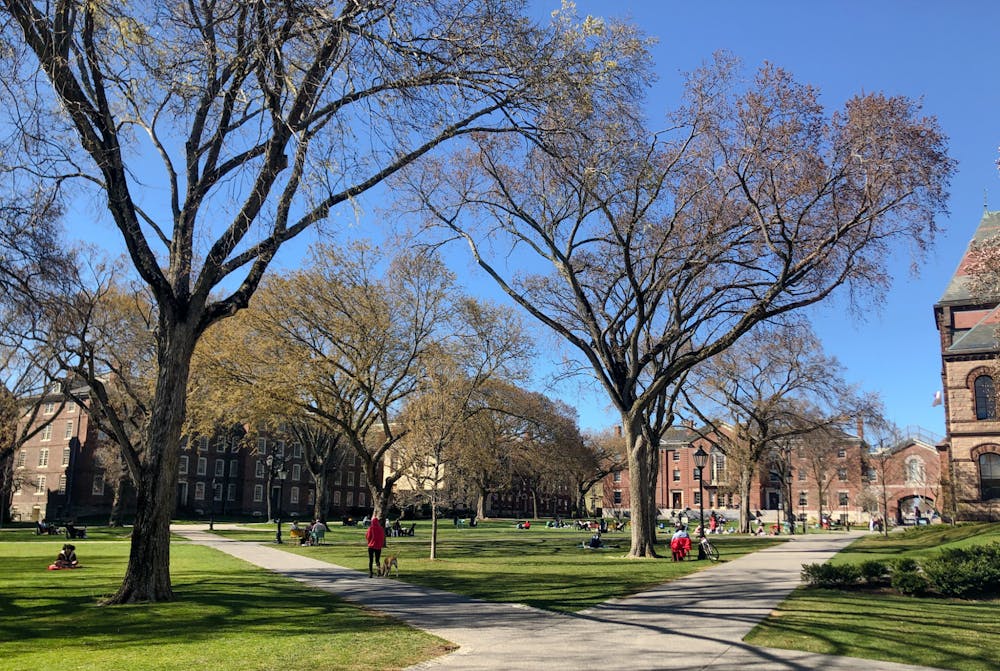President Christina Paxson P’19 gave a tentative response to the February recommendations of the Advisory Committee on University Resources Management, which she said aim to “amend the University's business ethics practices in response to a petition by the Scholars at Brown for Climate Action,” at the April faculty meeting Tuesday.
SBCA’s proposals ask the University to set minimum standards for its gift and business policies to stop Brown from doing business with organizations that perpetuate climate disinformation, The Herald previously reported.
ACURM — an advisory committee that evaluates the ethics of the University’s investment and business practices in accordance with its mission and values — recommended in March that the University create a path for taking action against organizations that deny climate science, maintain its current gift acceptance policy and amend its business ethics policies to indicate its refusal to do business with organizations that knowingly undermine science.
Paxson said she tentatively plans to have the University develop a process for gift and grant acceptance that better reflects the University's mission and values, protects academic freedom, fosters trust within the Brown community and does not politicize gift and grant acceptance or use business practices as an advocacy tool.
This will be done through the establishment of a provisional Due Diligence Review Committee which will be formed this semester, she said. This committee, which Paxson said could possibly be made up of the provost, the executive vice president of finance and administration and two faculty members from ACURM and the Research Advisory Board, respectively, would “conduct reviews as needed … (and) make recommendations to (the president) and (the) Corporation.”
Paxson also aims to establish a committee that will work over the summer to finalize plans for a review process.
On behalf of the Faculty Executive Committee, Professor of Applied Mathematics Govind Menon PhD’01 summarized the March 18 Faculty Commons held to discuss the recommendations.
“While there is complete consensus on the need to prevent science misinformation, … there are fundamental values at stake, in particular academic freedom and the ethics of science,” Menon said. “Pragmatic challenges include the need to distinguish between gift and grant policies and the need to develop fair processes that ensure high ethical standards for funding without compromising the smooth functioning of the University.”
Paxson presented her preliminary reactions to the recommendations which she plans to discuss with the Corporation, the University’s highest governing body, despite not requiring its approval for acceptance.
One of Paxson’s concerns about ACURM’s recommendations was its exclusion of faculty funding from restrictions under a proposed gift and grant acceptance policy — which was part of an effort by ACURM to protect academic freedom. “The boundary between what is and isn’t faculty (research), and what should or shouldn’t be protected by academic freedom, is blurry,” she said. “Having one ethical standard for one thing and another for another within the University doesn’t make much sense to me. Anything we do, I think, has to apply to all gifts and grants regardless of purpose.”
“Our mission is to advance knowledge and understanding. So science disinformation — which is defined as knowingly spreading false information with the intent to deceive or mislead — is not consistent with our mission,” Paxson added.
Paxson suggested that “to the best extent practical, … we're not going to do business with organizations that directly support science disinformation defined in this way.” If implemented, a policy in line with Paxson’s statement would extend beyond ACURM’s recommendations by applying to all scientific disinformation beyond climate change denial, but would not apply to organizations that support “opposition to science or science policy, … (as) these concepts are very broad, and they’re not very well-defined,” she said.
The President’s report, during which Paxson addresses the faculty and administration at the meeting, also summarized the recent Land Acknowledgement Working Group recommendations, which include the establishment of a formal University land acknowledgment, a group charged with drafting “a piece of real scholarship on this issue,” a memorial on campus planned with the Narragansett people and more educational opportunities for local tribal youth.
A formal response to these recommendations will be released by the President in the coming weeks. “It will come out soon because I would like to be able to have a land acknowledgment that we can actually use at Commencement,” Paxson said.
Paxson also awarded five faculty members the President's Award for Excellence in Faculty Governance: Kenny Breuer, professor of engineering; Harold Cook, professor of history; Tamar Katz, associate professor of English; Melvin Rogers, associate professor of political science; and Sharon Swartz, professor of biology and engineering.

Alex Nadirashvili was the managing editor of multimedia and social media for The Brown Daily Herald's 133rd Editorial Board. As a former University News editor, he covered faculty, higher education and student life, though his proudest legacy is The Brown Daily Herald TikTok account.





